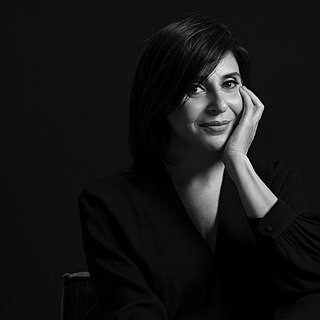Jean Pierre Lefebvre is a Canadian filmmaker. He is widely admired as "the godfather of independent Canadian cinema," particularly among young, independent filmmakers.
The Prix Iris is a Canadian film award, presented annually by Québec Cinéma, which recognizes talent and achievement in the mainly francophone feature film industry in Quebec. Until 2016, it was known as the Jutra Award in memory of influential Quebec film director Claude Jutra, but Jutra's name was withdrawn from the awards following the publication of Yves Lever's biography of Jutra, which alleged that he had sexually abused children.

Philippe Aractingi is a film director and producer. He was born in Beirut, Aractingi is Franco-Lebanese.

The cinema of Lebanon, according to film critic and historian Roy Armes, is the only other cinema in the Arabic-speaking region, beside Egypt's, that could amount to a national cinema. Cinema in Lebanon has been in existence since the 1920s, and the country has produced more than 500 films.

Danielle Arbid is a French filmmaker of Lebanese origin who has been directing films since 1997.

Ezza Agha Malak is a Lebanese-born French novelist, poet, critic and essayist.
Québec Cinéma presents an annual award for Best Actress to recognize the best in the Cinema of Quebec.
Québec Cinéma presents an annual award for Best Supporting Actress to recognize the best in the Cinema of Quebec.
Myriam Verreault is a Canadian film director and screenwriter. She is most noted for her 2019 film Kuessipan, for which she received a Canadian Screen Award nomination for Best Adapted Screenplay at the 8th Canadian Screen Awards, and two Prix Iris nominations for Best Director and Best Screenplay at the 22nd Quebec Cinema Awards.
The Prix Iris for Best Documentary Film is an annual film award presented by Québec Cinéma as part of its Prix Iris program, to honour the year's best documentary film made within the cinema of Quebec.

Goddess of the Fireflies is a Canadian drama film, directed by Anaïs Barbeau-Lavalette and released in 2020. An adaptation of the novel by Geneviève Pettersen, the film centres on the coming of age of Catherine, a teenage girl living in a small town in Quebec in the early 1990s.

Fadia Ahmad is a Spanish-Lebanese photographer, artist, and filmmaker.
The Free Ones is a Canadian documentary film, directed by Nicolas Lévesque and released in 2020. An expansion of his 2015 short film Interview with a Free Man , which was named by the Toronto International Film Festival as one of the Canada's Top Ten short films in 2015. The film is a portrait of several ex-convicts who are readjusting to life as free men with jobs at a sawmill in Roberval, Quebec.

Dave Not Coming Back is a Canadian documentary film, directed by Jonah Malak and released in 2020. The film centres on diver Dave Shaw's death while attempting to recover the body of Deon Dreyer from the submerged Boesmansgat cave in 2005, through a mix of camcorder footage from the incident and the personal reflections of his surviving friend Don Shirley.
Kelly Depeault is a Canadian actress from Sherbrooke, Quebec.
In the Land of the Flabby Schnook is a Canadian virtual reality animated short film, directed by Francis Gélinas and released in 2020. The film tells the story of a young boy who is afraid of the dark, and his older sister's efforts to help him overcome his fears.
Dominique Dussault is a Canadian film producer from Quebec. She is most noted as producer of the film Nadia, Butterfly, which was a Canadian Screen Award nominee for Best Picture at the 9th Canadian Screen Awards and a Prix Iris nominee for Best Film at the 23rd Quebec Cinema Awards.







